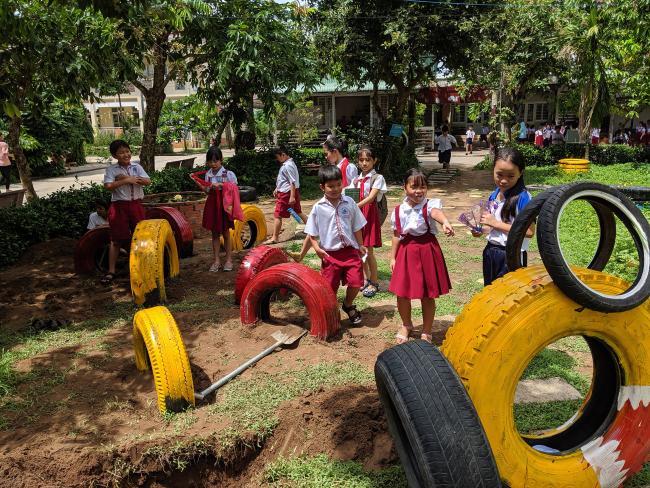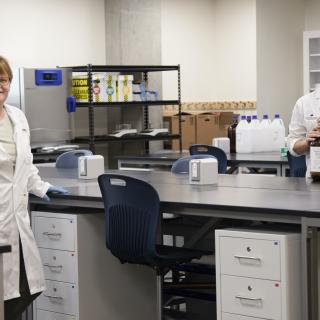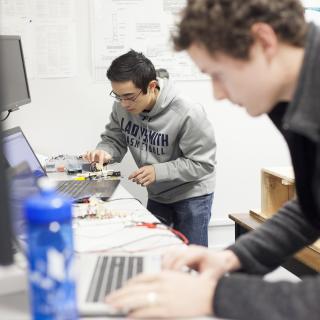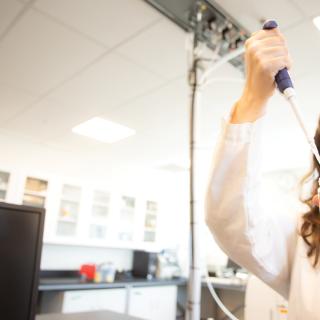Engineering solutions and relationships more than 10,000 kilometres from Nanaimo
Nine first-year Vancouver Island University (VIU) engineering students put their knowledge to work in another country and came back with new skills, friends, and insight about living and working with people in a different part of the world.
At the end of the instructional year, students from the Engineering Transfer certificate program stepped outside of their comfort zones and traveled across the Pacific Ocean to a coastal province within the Mekong Delta region of southern Vietnam. They were there to take part in an engineering field school activity at Trà Vinh University (TVU).
Led by VIU Engineering Professor Dr. Brian Dick and his counterparts at TVU, students from both universities were paired together to participate in cultural and engineering activities over a three-week period.
“This was more of a cultural exchange and a relationship-building exercise,” says Dick. “We want to show there is commonality in life and in learning. They are all first-year students and the engineering principles are the same despite coming from different backgrounds.”
“We could not communicate at all in the beginning,” says VIU student Nick Ramsay. “But I was curious, so I wrote down a couple of calculus problems and gave them to my roommate to solve. The method he used to solve it was the same, so even though I could not talk to him I was able to find commonality in a math equation.”
The field school was partially funded through a WorldVIU Global engagement grant, which helps faculty and staff develop international teaching and learning opportunities benefiting the VIU community.
Over the past 10 years, Dick has participated in teaching activities at TVU and has wanted to build connections between students at both institutions.

Two years ago, VIU students participated in a virtual engineering project designing a bridge for the town of Trà Vinh, while TVU students designed one for Victoria. They each built a Popsicle model of those bridges as a classroom exercise.
“At the stakeholder phase they had to learn about each other, about the community’s needs and establish lines of communication,” says Dick.
Interaction between the teams was restricted to virtual conversations, but Dick wanted to take the idea a step further and have the students physically work alongside each other. For several months, he worked with his colleagues at TVU to organize the trip.
The nine VIU students were each paired with a student from TVU, and shared a dorm room for three weeks, requiring them to find ways to overcome language and cultural barriers. “There is not a lot of tourist traffic in Trà Vinh so they do not get to hear a lot of English and none of our students spoke Vietnamese,” adds Dick.
About 160,000 people live in Trà Vinh, slightly more than the population of the Regional District of Nanaimo. However, Dick says, the city itself is more compact and not as spread out as Nanaimo and is surrounded mainly by farmland. Many of the TVU students travel home on weekends to be with their families.
The first week students spent most of the time learning about each other, sharing cultural experiences and studying.
“The culture in Vietnam taught me to express my true thoughts more clearly,” says VIU Student Michael Morris. “The people I met through this field school asked more personal questions than I was used to, and as a result connections and relationships were forged faster and stronger through the absence of withholding information and thoughts.”
Over the remaining weeks the VIU students taught some basic English language to elementary school students and participated in some technical projects contributing to the community. One project involved making playground equipment out of recycled materials for a local elementary school.
“All of the students went to the school and talked to the children, the teachers and the principal. They checked out the existing playground equipment and had to evaluate what would be suitable for the area and then spent a day making and installing new equipment,” says Dick.
“It was a difficult task to stay on the same page as the TVU students as they had different ways of doing things,” says Thea Loffler. “My group made a dragon out of recycled tires that we painted and dug into the ground. When we were finished the children came out to play and we got to see how much they loved it. It was a very rewarding experience.”

Engineering students from both schools also accompanied TVU electrical engineering students to a commune in the Cang Long district and helped design, repair and replace electrical wiring and components in 10 homes.
Dick says the teaching goes beyond the fundamentals of engineering. The students learned how to effectively communicate and work with people from different backgrounds where the standards of practice may be different – a scenario they will likely encounter in their careers.
“Working closely with the Trà Vinh students sparked creativity through the unorthodox approaches of idea generation for the projects,” says Morris. “That is an increasingly hot commodity in today’s technologically advancing world.”
Morris encourages all students to participate in a field school or education abroad program if presented with an opportunity.
“The experience has opened my eyes to how much this world has to offer and how interconnected all humans are,” says Morris. I have made lifelong friends in Vietnam, and I look forward to seeing them again.”
Dick is already planning the next engineering school field trip, which will hopefully take place next year.
-30-
MEDIA CONTACT:
Annette Lucas, Communications Officer, Vancouver Island University
O: 250.741.2020 | C: 250.618.7296 | E: Communications@viu.ca





